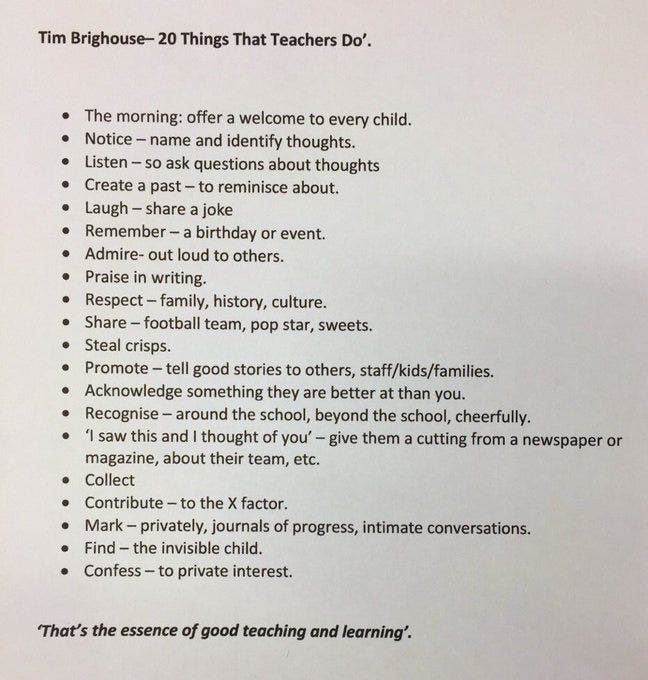42. Tim Brighouse’s list of ’20 Things That Teachers Do’
The inspirational educationalist who was a powerful force for good in schools, education and life
Happy new year to everyone. I am looking forward to continuing to explore how to organise in ways which are both humane AND effective, and connecting with past, present and future ideas as we move into 2024.
Tim Brighouse
The death was announced just before Christmas of Tim Brighouse (1940-2023), educationist, teacher, principal, chief education office, advisor, author and maverick. His obituary is well worth reading; it recounts a life of commitment to learning, pupils and schools, a desire to improve things by showing the way forward (as opposed to the threats and coercion employed by government ministers and chief inspector of schools).
I never met Tim Brighouse but was fortunate to be involved in one of his innovations, the University of the First Age. Brighouse was chief education officer in Birmingham in the mid-1990s. As his obituary recounts:
This was one of the largest and worst performing authorities in the country, with a huge multiethnic pupil population and mediocre schools from which the middle classes were fleeing to former grammar schools that had already opted out of local control.
Characteristically, Brighouse was nowhere to be found in the authority’s headquarters in the week he was supposed to start [as chief education officer]: instead, he was out quietly visiting schools, talking to staff and pupils to see how they were performing.
Within weeks, as if his job was not demanding enough, he found himself under direct and personal attack by [John] Patten, the Major government’s education secretary, whom he had known for years as his local MP. Patten, who was an Oxford academic, attacked Brighouse by name during a fringe meeting at the 1993 Tory conference, saying: “I fear for Birmingham with this madman let loose, wandering the streets, frightening the children.”
Patten attempted to laugh the remarks off as satirical and, hubris rapidly succeeding arrogance, apologised. Friends of Brighouse rallied round to pay for a libel action which cost the minister more humiliation and a reputed £30,000 in damages plus almost as much in costs, from which his standing as a minister never really recovered. Within months he would resign through ill health following a mass teacher boycott of the new Sats tests. Brighouse donated the money to setting up his scheme for a so-called University of the First Age, aiming to improve the literacy rates of Birmingham’s most deprived teenagers.
University of the First Age
The University of the First Age (UFA) was a marvellous invention. The name came from a play on the much better-known University of the Third Age (now the U3A) where senior citizens get together to learn about all kinds of things, mainly under their own steam and by sharing their own knowledge. (My wife Jenny is the assistant treasurer of the Edinburgh U3A and I spoke about music and the brain at one of their meetings last year, so this is a very live concept in our household!) The UFA, a Birmingham initiative, saw volunteer teachers holding classes using lively and unconventional teaching approaches on school premises but outside school hours. The Conservative government of the time was keen on strict classroom learning under chief inspector Chris Woodhead, who appeared to see teachers as liberal slackers inculcating their charges with loony left progressive ideas. (This was a ‘straw man’ argument – no evidence could be found but that didn’t stop Woodhead railing against it.)
The genius of the UFA approach was that, by holding these voluntary classes outside school hours, the strictures imposed by central diktat could simply be ignored. Normal subject boundaries could also be left behind, so (for example) a class revolving around cooking tortilla (Spanish omelette) could embrace maths, Spanish, chemistry, biology, geography and co-operation all around the central theme – which could also be eaten afterwards!
This kind of thinking, empowering and encouraging teachers who wanted to embrace more imaginative educational philosophies, was one part of Brighouse’s assault on the low levels of achievement in key subjects like maths and English. The results were transformational and widely praised (after Woodhead’s departure). At key stage two English, taken at 11, the percentage of pupils obtaining level four (the expected standard) or above had risen from 46% to 71%, maths scores had risen from 44% to 67% and science from 48% to 85%.
I was lucky enough to be invited to work with the UFA’s tiny core group and some of the teachers in helping them think about how to use accelerated learning, whole-brain approaches and multiple intelligences in bringing variety and engagement to the (out-of-hours) classroom. I also helped them to work out how to use music to amplify shifts of energy, sustain concentration, aid reflection and more. (There’s several future Substack posts right there, I think…)
20 Things That Teachers Do
After Tim Brighouse’s death, a post started to do the rounds on social media. School principal Simon Smith said:
Just read of the sad loss of Sir Tim Brighouse. This list has been on the wall of my class then Office for ever and was and is the most important list I’ve ever had. It’s constantly reminded me that teaching is more than what happens in lessons and that it’s about being human.
And here is the list:
This list is very well worth reading not simply as things that teachers do, but as things that all of us in leadership roles might think about and connect with our own settings. A few of the things that strike ME are:
The morning: offer a welcome to every child
This is such a key Host Leadership idea! Welcoming everyone into the work space at the start of the day is such a powerful means of connecting, of showing care, of showing concern, of showing where one’s priorities lie. The same can be said of greeting visitors and guests. One of the personal highlights of my exploration of Host Leadership was going to meet Philip Newman Hall, general manager of the top-end Manoir Aux Quat’ Saisons restaurant/hotel in Oxfordshire, walking up to the door – to find him waiting outside to greet me! Meeting people at the threshold, the place they step over the boundary and enter our space, is a natural way of meeting, connecting and engaging.
Create a past – to reminisce about
Having a shared past, shared experiences that we’ve been through together and which helped make us what we are, is such a vital part of relationship building. Many people know my enthusiasm for solution focused work, and of course I am keen to help people remember events in the past which support their progress now towards a better future for which they hope. The past doesn’t have to all be about success; bad times lived through, things which don’t happen any more, even funny things which we can laugh about now (but didn’t see so funny then) can all be part of a shared journey including both success and failure, laughter and pain.
Praise – in writing
I think Brighouse is pointing to a useful distinction here, about praising in writing and admonishing in person (if necessary). Often we may start from a position that encouragement is an in-the-moment, transitory thing while errors are to be formally noted. Brighouse turns this on its head; praise in writing (as well as in person) so that it can make an even bigger impact, be read and re-read, even shared. He also includes ‘admire – out loud to others’. The ‘to others’ is important here – if others hear it, then the admired one can be doubly pleased, while everyone else sees someone who is generous in public about someone else (and so might be expected to do the same for them one day).
Steal crisps
At first glance this is a bit curious. It seems counterintuitive that a senior person should be taking potato crisps from a child’s snack bag. Thinking about it, it’s an intimate thing to do. It’s only one or two crisps, not the whole bag. And it’s about a playful aspect of a relationship which opens up connection, shared interest (in crisps at least) and the chance to be exuberant and unexpected.
Find – the invisible child
Who is the person who never gets attention, who fades into the background, who seems to be always there but never here? Brighouse’s pointer is to seek that person, notice them, ask them a question, engage them in something. The act of looking around to see just who isn’t making a noise, complaining loudly, showing off, putting their hand up or charging forward is a teacher move, and a great host leadership move too. Even a small noticing may be the start of new confidence, new participation and new self-respect.
Conclusion
I think all of Brighouse’s 20 things are worth exploring. That this list has affected so many in the world of British education is testament to its value. Brighouse was a great advocate for valuing and supporting teachers, not belittling them. That on its own is a strong idea in the world of effective and humane organisations.
Dates and Mates
My main date for the first half of 2024 is at the Host Leadership Gathering in Sofia, Bulgaria on 3-4 June 2024. I’ll be there to explore leading as a host (not a hero or a servant) with people from around the world; some will be experienced in the ideas and others will be coming to explore something new. It’ll be two very full days of learning, sharing, experimenting and hosting with a good social programme, host leadership practitioners from around the world and a chance to revitalise your leading and leadership development practices for the challenges of a divided and impatient world.






Mutual respect between teacher and pupil goes a long way.